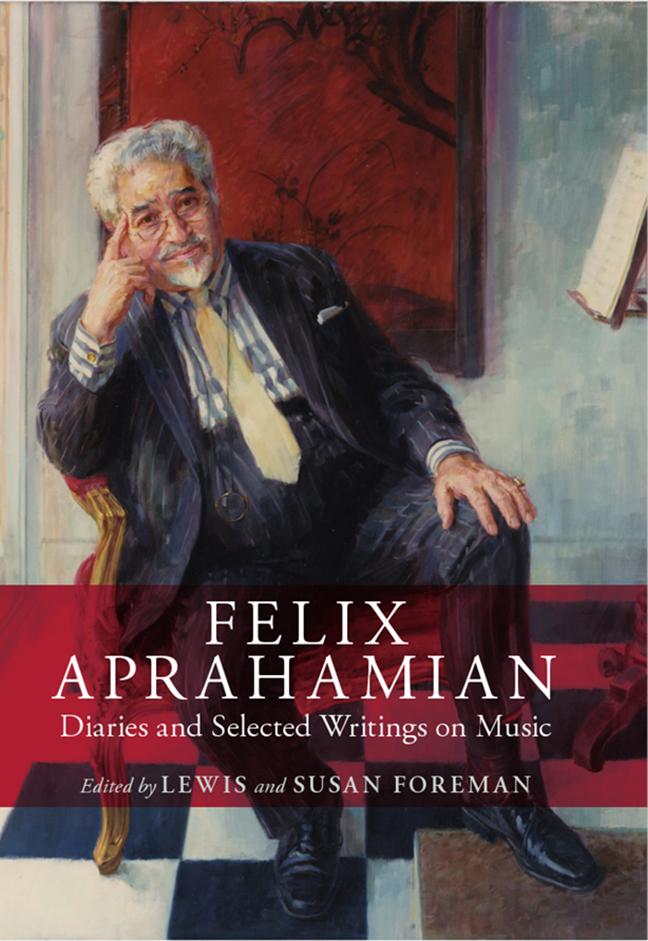Book contents
- Frontmatter
- Contents
- Illustrations
- Foreword
- Preface
- Acknowledgements
- Introduction: Felix Aprahamian: A Life in Music and Criticism (5 June 1914 – 15 January 2005)
- Part I The Musical Diaries of Felix Aprahamian
- Part II Articles and Reminiscences about Friends and Contemporaries
- Part III Remembering the Great Organists
- Select Bibliography
- Index
- Previous Books by Susan and Lewis Foreman
Part II - Articles and Reminiscences about Friends and Contemporaries
Published online by Cambridge University Press: 20 December 2023
- Frontmatter
- Contents
- Illustrations
- Foreword
- Preface
- Acknowledgements
- Introduction: Felix Aprahamian: A Life in Music and Criticism (5 June 1914 – 15 January 2005)
- Part I The Musical Diaries of Felix Aprahamian
- Part II Articles and Reminiscences about Friends and Contemporaries
- Part III Remembering the Great Organists
- Select Bibliography
- Index
- Previous Books by Susan and Lewis Foreman
Summary
Ernest Ansermet
Lecture at the British Institute of Recorded Sound
First given as a lecture at the BIRS, Exhibition Road SW7, on 9 March 1970, as part of a series that ran through the 1960s and 1970s. The recordings played (all Decca LPs except where noted) were:
Falla, The Three-Cornered Hat – Finale (LXT 2716)
Stravinsky, The Rite of Spring – final dance (LXT 2563)
Debussy, Rondes de printemps (LXT 5650)
Stravinsky, The Soldier's Tale – Royal March (LXT 5321)
Stravinsky, Song of the Nightingale – excerpt (LXT 5233)
Stravinsky, Les Noces – excerpt (LXT 5639)
Handel, Concerto Grosso No 2 in F major – excerpt (T 113, 78rpm)
Stravinsky, Petrushka – dance of the wet-nurses (LXT 2502)
Roussel, Symphony No. 3 – Scherzo (LXT 5234)
Ansermet, What Everyone Should Know About Music – excerpt (LXT 6313)
Honegger, Symphony No. 2 – Finale (LXT 6003)
Martin, Concerto for seven wind instruments, timpani, percussion and strings (LXT 5676)
The lecture was later published in the journal of the BIRS – Recorded Sound 72 (October 1978), pp. 816–19 (the text printed here).
Ernest Ansermet died on 20 February 1969. For nearly half a century – excepting the duration of the last war – he was a regular visitor to London, a city to which he was devoted. I think I can do no better than plunge into my first illustration, which is Ansermet conducting a muchloved score – Manuel de Falla's Three-Cornered Hat – of which he gave the very first performance here in London, with the Diaghilev Ballet in July 1919.
A month before that auspicious first performance of Falla's Tricorne, Ansermet had conducted another première for the Diaghilev Ballet here in London, that of the Rossini–Respighi La Boutique fantasque. We can see right away that we are dealing with a conductor whose fame and reputation were built not on his interpretation of the reach-me-downs of the classical repertoire – although it was a sore point with him that his Haydn, Beethoven and Brahms were not accepted by the pundits in the same way as his Debussy, Stravinsky or Falla – but on his championship of the newer, younger composers of his time.
In a series like this, I think it would have been so much more interesting for you to have heard someone discussing Ansermet's art as a conductor who knew him and worked with him in those distant days of the Diaghilev Ballet.
- Type
- Chapter
- Information
- Felix AprahamianDiaries and Selected Writings on Music, pp. 208 - 358Publisher: Boydell & BrewerFirst published in: 2023

